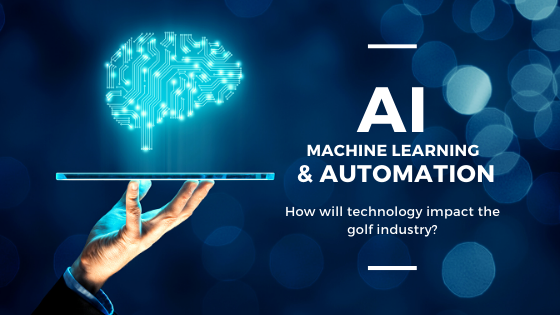You may have heard the rumblings. AI, Automation, and Machine Learning are coming for your golf job!
Not so fast.
Sure, in 20 years, your fleet of mowers may leave the maintenance facility at 1 am and mow your course. An algorithm might code your invoices for you, too.
AI and Automation are already here, and these technologies aren't going to replace your greens mower. They do allow you and your entire team to operate more effectively. They will make you more productive, give you time back in your day, and help you run a more efficient and profitable operation. Here's how.
"Robots aren't replacing everyone, but a quarter of U.S. jobs will be severely disrupted as artificial intelligence accelerates the automation of existing work, according to a new Brookings Institution report."
Sales Automation
Most clubs see a steady stream of new leads coming in from their websites and advertising campaigns. We generally see clubs converting around 10% of these leads into banquets, outings, or memberships.
What happens to the other 90%? They're lost in the depths of someone's inbox, never to be communicated with again.
Most clubs understand they should be keeping a list and communicating with turn-downs regularly. But most clubs don't have the time, resources, or technology to manage this process effectively.
What if all your turn-downs automatically went to a special email list? What if that email system automatically sent them relevant content each quarter about event packages, booking promotions, or theme ideas?
Wouldn't that help drive a few new bookings each year without taking anyone's job?
Automation for Golf and Banquet Event Operations
Many clubs see 25% or more of their revenue via outings and banquets, with dozens of unique events each month of the season. Most clubs also know they should check-in with the event coordinators at regular intervals at 90, 30 and 14 days before the event date. Most clubs don't have the time to manage this process.
What if the system automatically messaged coordinators at these intervals? What if it automatically checked in on player/guest counts, menu finalization, and what hole to put the long-drive contest on?
Technology can accomplish this for you already, and nobody has to lose their job. These technologies make your team more efficient and effective, driving bottom-line results.
Machine Learning and Tee Time Reservations
Let's venture a bit into the abstract. What if you had a savant in the golf shop who knew every customer, when they liked to play, and what price-points they booked? What if you charged this genius with reaching out to those specific customers with specific offers for reservations that were relevant to their personal preferences? That person would probably help fill and maximize your tee sheet.
That person doesn't exist, but AI does. When connected with a communication platform like email or text, it can do exactly the above. AI engines can crunch historical reservations data to learn which players like to play on Saturday afternoons. It can identify their price sensitivities and determine what rate will drive action. With this information in-hand, we can deliver automated messages inviting them to play when they want, at the price they want.
Again, nobody loses their job, but AI and Automation make your business more efficient by driving revenue without incremental payroll costs.
AI & Machine Learning for Memberships
There are a few systems out there that help you understand member-spending. Generally, they aggregate member purchases and club visits and return a report that enables you to know your best customers and those who are "at-risk." These systems are AWESOME and extremely helpful for club managers.
(Please excuse me while we get a bit technical here)
However, these systems rely on outdated processes that "hard-code" IF/THEN statements to tell you who might be "at-risk." For example, the software might work like this:
IF customer has no visits in 30 days
THEN the customer is at-risk
ELSE everything is hunky-dory
Don't get me wrong, the IF/THEN above is better than NULL, but machine learning is vastly superior because it can handle infinitely more variables. The above example raises some practical questions:
How do we know 30 days of no activity correlates with a member being at risk? Is there a statistical model for that?
What other factors could put a member-at-risk? Decreased year-over-year spending? Reduced family-member visits to the club? Could weather, the economy or competition have an impact?
What happens when preferences change? Who will do a new analysis and update the IF/THEN?
A statistician could answer the questions above, and a software engineer could write a complex series of IF/THEN statements to deliver the answers. That would take a lot of money and a lot of time.
With AI and Machine Learning, we can replace these IF/THEN prediction systems (and their high cost) with dynamic machine learning predictions that utilize a neural network to connect independent data-points. The AI process is faster, cheaper, and more accurate than IF/THEN.
Again, nobody loses their job, but AI delivers you better results and allows you to manage your business more effectively.
In the coming decades, we may see job losses due to AI and Automation. But in the near term, AI and Automation will make all of our lives easier. They'll help us eliminate routine tasks. They'll help us make more informed decisions. They'll help us get more done in less time.
AI and Machine Learning will augment your team of experts, not replace it.
